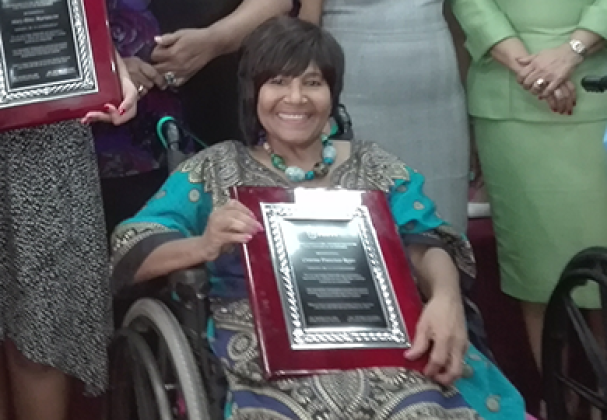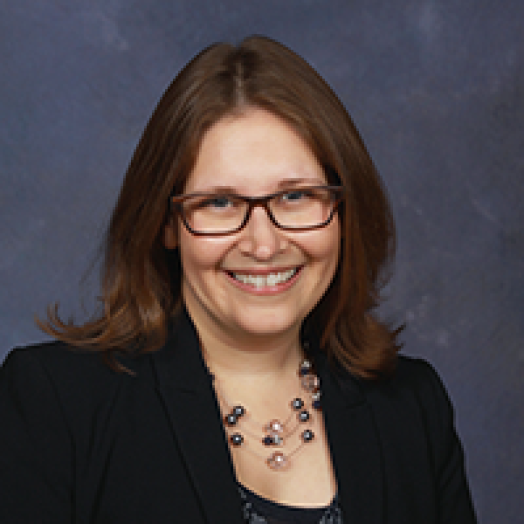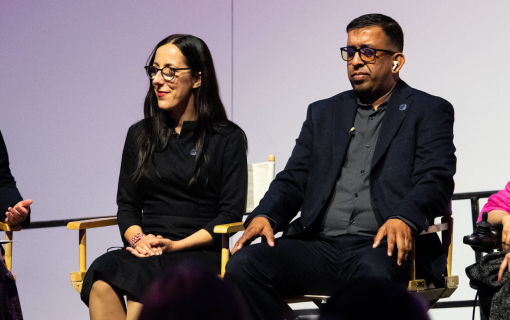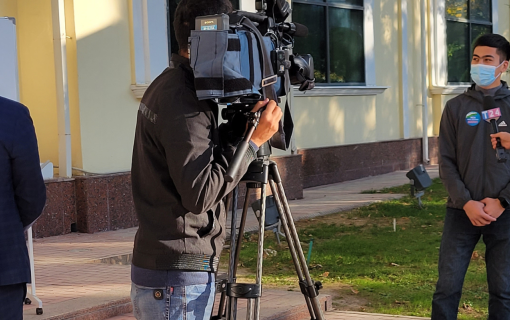
Dominican Disability Rights Advocate Cristina Francisco Wins “Everyday Heroine” Award
by Marit Björnlund*
Cristina Francisco is the head of the Disability Alliance for Our Rights (ADIDE), an organization in the Dominican Republic that advocates for disability rights and connects other civil society groups. Since 2018, the International Foundation for Electoral Systems (IFES) has collaborated with ADIDE on the “Promoting Political Leadership for Youth with Disabilities” project funded by the United States Agency for International Development (USAID). Project activities include a semester-long Engaging a New Generation for Accessible Governance and Elections (ENGAGE) course for young people with disabilities at the Iberoamerican University in Santo Domingo and additional support for the 32 ENGAGE students, such as internship placements and meetings with policymakers.
In March, Francisco received an “Everyday Heroines” award from the National District of the Dominican Republic in recognition of her work promoting the rights of persons with disabilities and the progress made by the ADIDE-IFES project in sensitizing Dominicans to disability issues. In this Q&A, we ask Francisco about her work on disability rights, what has been achieved and what can be improved before the 2020 elections to further promote the equal rights of persons with disabilities in the Dominican Republic.
What is the significance of this National District prize? How did you react to the news that you had won?
The “Everyday Heroines” awards were granted by the Municipal Council of the National District through Resolution No. 6/2019, through which the councilors recognized women who have done outstanding work for the community and maintained a trajectory of support to society. On this occasion, International Women’s Day, [I was one of] 17 women who were recognized. This activity took place at the Municipal Council of the National District, with the participation of the highest municipal authorities.
I felt very honored and happy upon hearing the news that I would be recognized with this prize, especially because it will make visible the work that I am doing along with IFES and the support of USAID.
What part of the project or your work are you most proud of?
What made me most proud about this project is that we could bring together 32 young people with different disabilities and we were able to interact and develop the activities while taking into account the needs of each of them based on their type of disability – physical, visual, auditory, intellectual or cognitive and invisible disabilities. In addition, the youth, through this project, built their skills and learned about existing laws and norms about disability from their peers given their different disabilities, creating an excellent synergy among [them].
Can you tell us an anecdote that demonstrates the impact of the collaborative work of ADIDE and IFES?
Notwithstanding my involvement in work and activism to defend the rights of people with disabilities in my country, it’s not easy for people with disabilities to achieve access to decision-makers and politicians. So, it’s important to appreciate that thanks to the trajectory of IFES’ international work, many officials’ and politicians’ doors were opened. And then it was possible to establish alliances of collaboration that will continue even after the project ends, all for the benefit of the young people [we worked with]. Two young people got hired after doing their internship placement through this project, and three more are in the process of applying for jobs.
"...thanks to the trajectory of IFES’ international work, many officials’ and politicians’ doors were opened. And then it was possible to establish alliances of collaboration that will continue even after the project ends, all for the benefit of the young people [we worked with]."
In the upcoming months, how do you hope to expand this work to advance the political rights of persons with disabilities in the Dominican Republic?
I think it will be very interesting to be able to continue working on this same theme, but training on the new electoral law and the new form of electronic voting, including young people with disabilities in the electoral process coming up in 2020, since it will be very important to youth with disabilities who will be exercising their right to vote for the first time. For this we must work to achieve that polling stations have accommodations and that some of the recommendations from our 2016 election access observation be implemented. [For example] the “assistive table” could be implemented on a pilot basis in some stations, from which persons with disabilities can offer guidance to other persons with disabilities.
The “Promoting Political Leadership for Youth with Disabilities” project in the Dominican Republic is supported by USAID. The project’s objective is to empower youth with disabilities to take a more active role in political life and citizen participation. The project has included activities to strengthen the political leadership and empowerment of these youth, including through the intensive political leadership course and internships with public institutions and civil society organizations.
*Marit Björnlund is a program coordinator for the Americas at IFES.











